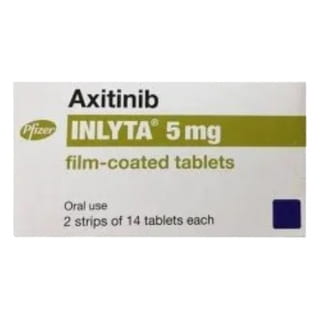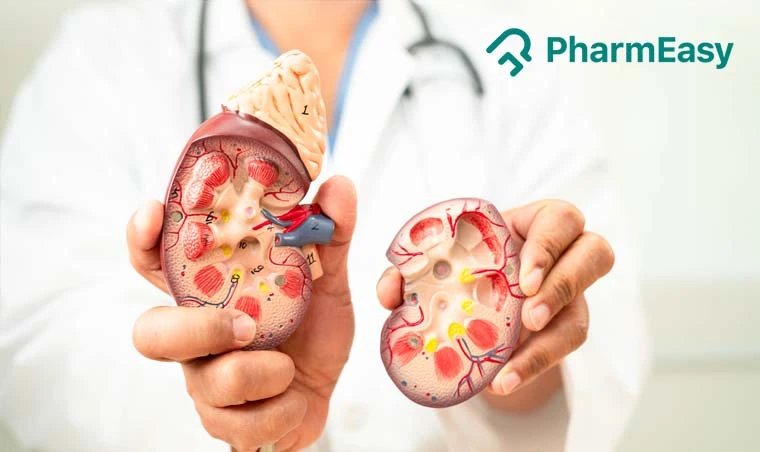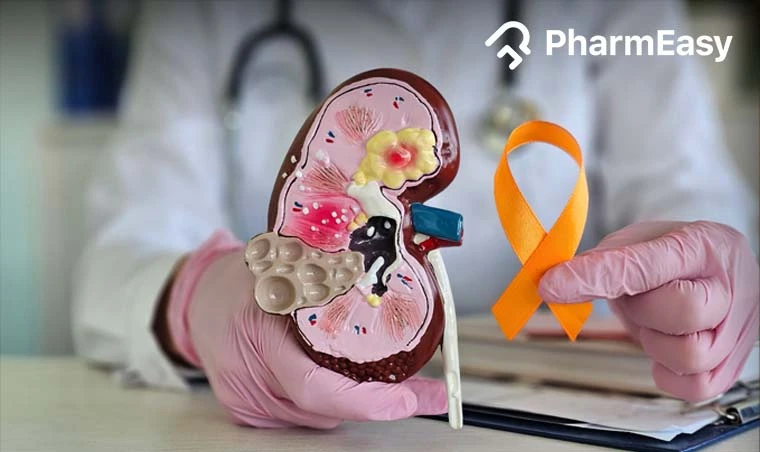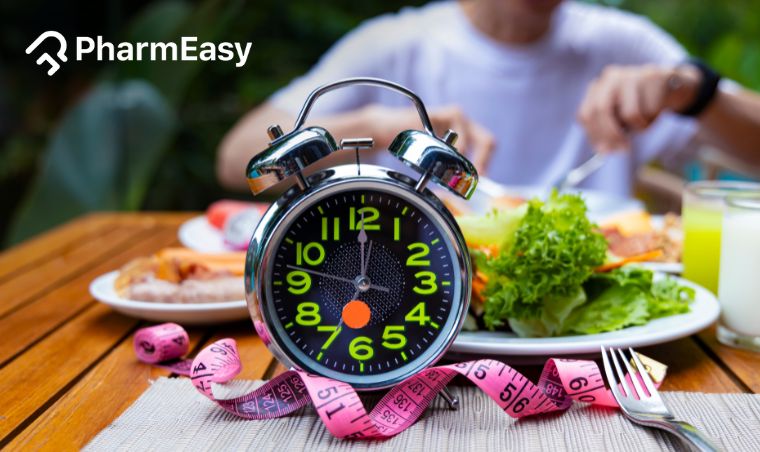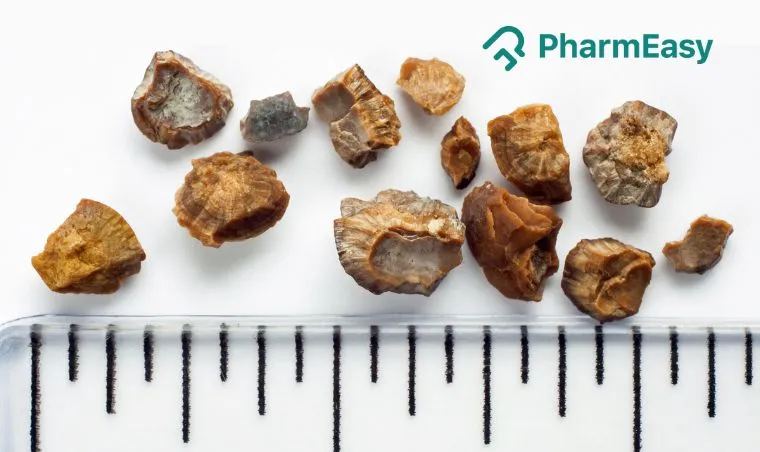Inlyta 5mg Strip Of 14 Tablets
Description
Inlyta 5 mg tablet is an anti-cancer medicine used in the treatment of kidney cancer. It can be taken with or without food, but try to take it at the same time every day to maximise its benefits. Your doctor will determine the necessary dosage and frequency of intake, which will depend on your specific treatment needs and may vary over time.
Common side effects of this medication include high blood pressure, joint pain, and loss of appetite. Diarrhea and shortness of breath can sometimes be serious, so take medication to treat these symptoms as prescribed by your doctor and ensure you stay hydrated.
Before starting treatment, inform your doctor if you have thyroid issues, liver or bleeding disorders, or if you are taking any medications for infections. Many other medications can interact with, or be impacted by, this medication; therefore, inform your healthcare team about all medications you are using. This medication is not recommended during pregnancy or breastfeeding, and effective contraception is important for females during treatment to prevent pregnancy.
Product Summary
| Offer Price | ₹35893.82 |
| You Save | ₹5843.18 (14% on MRP) |
| Contains | Axitinib(5.0 Mg) |
| Uses | kidney cancer |
| Side effects | high blood pressure, joint pain, and loss of appetite |
| Therapy | ANTI-NEOPLASTIC |
Uses
Contraindications
Side effects
- Metabolism and Nutrition:
- Decreased appetite
- Nervous System:
- Headache
- Altered taste (Dysgeusia)
- Vascular:
- High blood pressure (Hypertension)
- Bleeding (Haemorrhage)
- Respiratory:
- Shortness of breath (Dyspnoea)
- Cough
- Hoarseness or voice changes (Dysphonia)
- Gastrointestinal:
- Diarrhoea
- Vomiting
- Nausea
- Abdominal pain
- Constipation
- Inflammation of the mouth (Stomatitis)
- Indigestion (Dyspepsia)
- Skin and Tissue:
- Hand-foot syndrome (Palmar-plantar erythrodysaesthesia)
- Rash
- Dry skin
- Musculoskeletal:
- Joint pain (Arthralgia)
- Pain in the extremities (arms, legs, hands, feet)
- Renal:
- Protein in the urine (Proteinuria)
- General:
- Fatigue
- Weakness (Asthaenia)
- Inflammation of mucous membranes (Mucosal inflammation)
- Weight loss (Weight decreased)
Precautions and Warnings
Other General Warnings
- You have a history of cardiac failure events.
- You develop signs or symptoms of cardiac failure.
- Your blood pressure is not well-controlled.
- You experience persistent hypertension despite using antihypertensive medication.
- You develop severe hypertension.
- You experience severe or persistent arterial hypertension along with symptoms suggestive of posterior reversible encephalopathy syndrome (PRES) (e.g., headache, seizure, confusion, blindness).
- You have a history of thyroid dysfunction (hypothyroidism or hyperthyroidism).
- You are at risk for or have a history of arterial embolic and thrombotic events (e.g., transient ischemic attack, myocardial infarction, stroke, retinal artery occlusion).
- You had an arterial embolic or thrombotic event within the previous 12 months.
- You are at risk for or have a history of venous embolic and thrombotic events (e.g., pulmonary embolism, deep vein thrombosis, retinal vein occlusion/thrombosis).
- You had a venous embolic or thrombotic event within the previous 6 months.
- You experience elevated haemoglobin or haematocrit levels.
- You have evidence of untreated brain metastasis.
- You have experienced recent active gastrointestinal bleeding.
- You have any bleeding that requires medical intervention.
- You have risk factors for aneurysms or artery dissections, such as hypertension or a history of aneurysm.
- You develop symptoms of gastrointestinal perforation or fistula.
- You have scheduled surgery (as axitinib should be stopped at least 24 hours prior).
- You experience signs or symptoms of posterior reversible encephalopathy syndrome (PRES) (e.g., headache, seizure, lethargy, confusion, blindness).
- You develop moderate to severe proteinuria (protein in your urine).
- You develop nephrotic syndrome.
- You experience liver-related adverse reactions, such as increased liver enzymes or bilirubin.
- You have moderate hepatic impairment (Child-Pugh class B).
- You have severe hepatic impairment (Child-Pugh class C) (as axitinib should not be used in this population).
Directions for Use
Storage and disposal
Dosage
Overdose
Missed a Dose
Mode of Action
How Does It Work?
Interactions
Interactions with other medicines
- Strong CYP3A4/5 inhibitors (e.g., ketoconazole, clarithromycin) significantly increase axitinib blood levels. Dose adjustment of axitinib may be necessary; avoid if possible.
- Grapefruit may also increase axitinib blood levels.
- Strong CYP1A2 and CYP2C19 inhibitors may potentially elevate axitinib blood levels; caution is advised.
Content Details
Ravindra Ghongade
B. Pharm
Dr. Nikita Toshi
BDS (Bachelor of Dental Surgery), WHO FIDES member
Frequently Asked Questions (FAQs)
Q: What should I avoid while taking Inlyta 5mg Tablet?
Q: Will I have regular check-ups while taking Inlyta 5mg Tablet?
Did you find this medicine information helpful?
Please rate your experience
